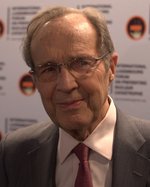
Perry William
Professor at the Stanford University (former Secretary of Defense); Ph.D. (USA)
William James Perry was born in Vandergrift (Pennsylvania) on October 11, 1927. He graduated from Butler Senior High School in 1945 and served in the United States Army as an enlisted man from 1946 to 1947, including service in the Occupation of Japan. Perry later received a commission in the United States Army Reserve through ROTC, serving from 1950 to 1955.
William Perry received his B.S. (1949) and M.A. (1950) degrees from Stanford University, and a Ph.D. in mathematics from Pennsylvania State University in 1957. He was the Director of the Electronic Defense Laboratories of Sylvania/ GTE in California from 1954 to 1964, and from 1964 to 1977 the President of ESL, Incorporated, an electronics firm that he helped found. From 1977 to 1981, during the Jimmy Carter administration, Perry served as the Under Secretary of Defense for Research and Engineering, where he had responsibility for weapon systems procurement and research and development. Among other achievements, he was instrumental in the development of stealth aircraft technology.
On leaving the Pentagon in 1981 William Perry became the Managing Director until 1985 of Hambrecht & Quist, a San Francisco investment banking firm specializing in high-tech and defense companies. Later in the 1980s and up to 1993, before returning to the Pentagon as the Deputy Secretary of Defense, he held positions as the Chairman of Technology Strategies Alliances, a Professor in the School of Engineering at Stanford University, and Co-director of Stanford's Center for International Security and Cooperation. He was also a member of the Packard Commission.
William Perry returned to the Pentagon as the Deputy Secretary of Defense in 1993. He was US Secretary of Defense from 1994 to 1997. A hands-on manager, he paid attention both to internal operations in the Pentagon and to international security issues. William Perry adopted «preventive defense» as his guide to national security policy in the post-Cold War world. In practical terms this strategy relied on threat reduction programs (reducing the nuclear complex of the former Soviet Union), counter-proliferation efforts, the NATO Partnership for Peace and expansion of the alliance, and the maintenance of military forces and weapon systems ready to fight if necessary.
William Perry is currently the Michael and Barbara Berberian Professor at Stanford University, with a joint appointment in the School of Engineering and at the Freeman Spogli Institute for International Studies where he serves as Co-director of the Preventive Defense Project and the Nuclear Risk Reduction Initiative. He is also a Senior Fellow at the Hoover Institution. He is an expert in U.S. foreign policy, national security and arms control.
Former Secretary William Perry also has extensive business experience and currently serves on the boards of LGS Innovations, Fabrinet, and several emerging high-tech companies. He is a member of the National Academy of Engineering and a Fellow of the American Academy of Arts and Sciences. Among Perry's numerous awards are the Presidential Medal of Freedom (1997), Knight Commander of the Order of the British Empire (1998) and the Grand Cordon of the Order of the Rising Sun (2002), awarded by the Emperor of Japan.
He is a member of the Supervisory Council of the Luxembourg Forum on Preventing Nuclear Catastrophe.